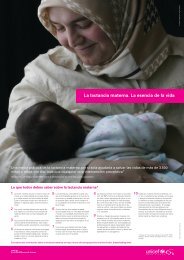SEXUAL ABUSE AND EXPLOITATION OF BOYS IN SOUTH ASIA A ...
SEXUAL ABUSE AND EXPLOITATION OF BOYS IN SOUTH ASIA A ...
SEXUAL ABUSE AND EXPLOITATION OF BOYS IN SOUTH ASIA A ...
Create successful ePaper yourself
Turn your PDF publications into a flip-book with our unique Google optimized e-Paper software.
prostitution or other immoral conditions” is punishable. 202 Although excluding all children<br />
between 16 and 18 from protection, this section at least provides protection for boys and girls<br />
under 16.<br />
4.2.4.2 Exploitation in travel and tourism<br />
Bangladesh has no legislation directly addressing sexual exploitation of children in travel and<br />
tourism, and the country has no extraterritorial agreements with other countries, except for<br />
Thailand to prosecute internationals who abuse Bangladeshi children. The Extradition Act<br />
punishes offenders against Bangladeshi children, and applies only for Thailand<br />
4.2.4.3 Trafficking for sexual exploitation<br />
The SVWCA is the primary law addressing trafficking, although it does not contain a clear<br />
and comprehensive definition of the term. The measure prohibits buying, selling, importing,<br />
exporting or taking custody of a child for immoral purposes. The law also makes it an offence<br />
to kidnap a woman or child. The law addresses “women and children” and the legal age for a<br />
child is below 16, accordingly the trafficked boys between the ages of 16 and 18 are not<br />
protected. The law places primary emphasis on cross-border trafficking with the term “from<br />
abroad”. 203 This follows from Section 5 (i) and 6 (i). The Penal Code, prior to the SVWCA,<br />
addressed trafficking primarily through its sections on kidnapping and abduction.<br />
The Penal Code penalizes those who convey a person outside of Bangladesh and those who<br />
take or entice males under 14 and girls under 16 from their lawful guardians. Kidnapping of a<br />
child under 10 with the intent that the child will be “subject to the lust” of another person, is<br />
considered an aggravated offence. Unfortunately for prosecution, the penalty for trafficking in<br />
the SVWCA is very severe: death or life imprisonment. Rather than having the deterrent<br />
effect intended by the law’s framers, it has made judges reluctant to impose such harshness on<br />
perpetrators without proof of the offence beyond reasonable doubt, resulting in very low<br />
conviction rates.<br />
In practice, however, these laws are infrequently used when a trafficker is apprehended at the<br />
India-Bangladesh border. Studies by two Bangladesh NGOs, Unnayan Bikalper<br />
Nitinirdharoni Gobeshona (UB<strong>IN</strong>IG) and the Bangladesh National Women Lawyers<br />
Association (BNWLA) found that arrested traffickers are usually charged under the<br />
Bangladesh Passport Order 1973 with the minor offence of crossing the border without a<br />
passport. This offence imposes a minimal fine and allows immediate release from custody. 204<br />
4.3 Policy<br />
The government has developed the National Plan of Action against the Sexual Abuse and<br />
Exploitation of Children including Trafficking 2002-2007 (NPA). The development of the<br />
202 Children’s Act 1974.<br />
203 Suppression of Violence against Women and Children (Amendment) Act 2003.<br />
204 Bangladesh National Women Lawyers Association, 1996, ‘Movement against flesh trade; UB<strong>IN</strong>IG, 1999,<br />
‘Fact finding missions on trafficking in women and children from Bangladesh to India and Pakistan’.<br />
58










